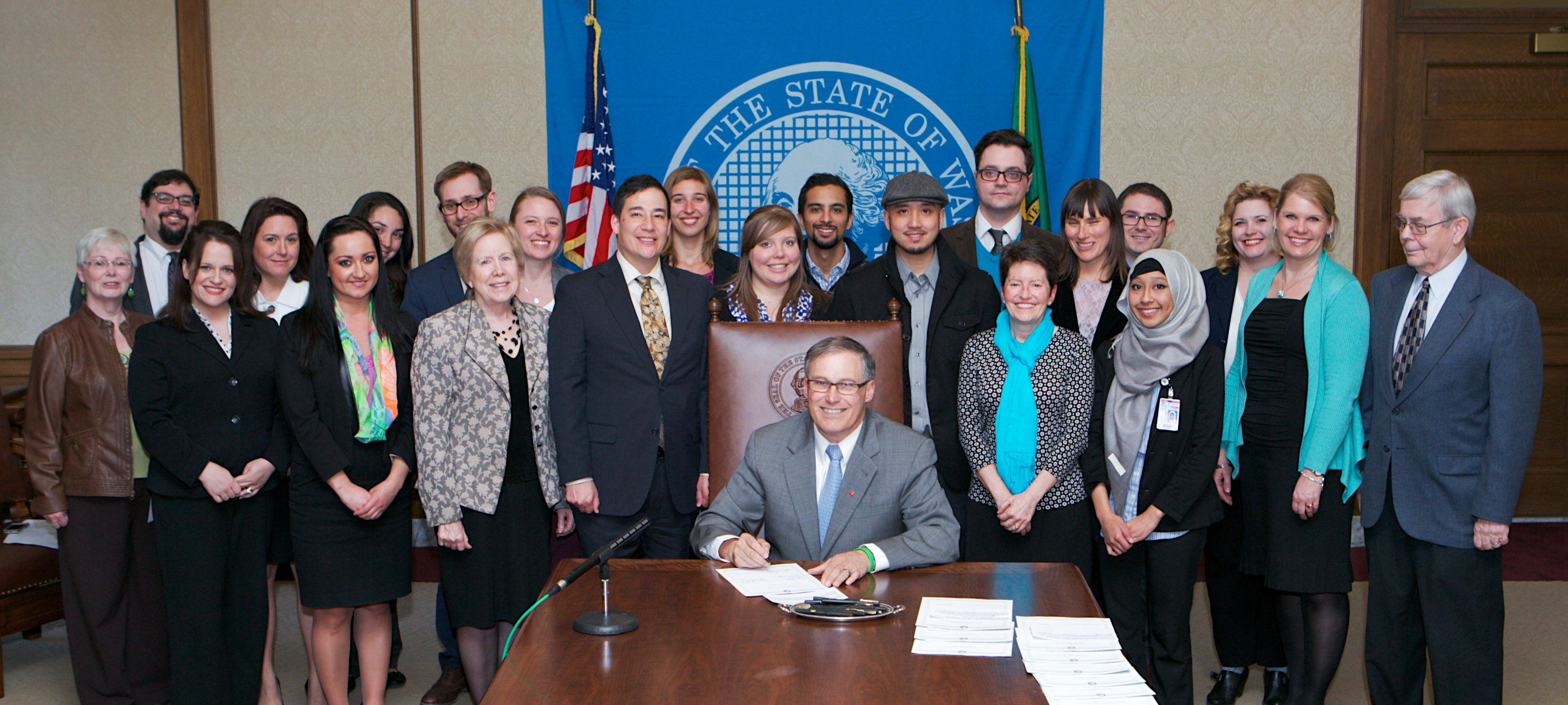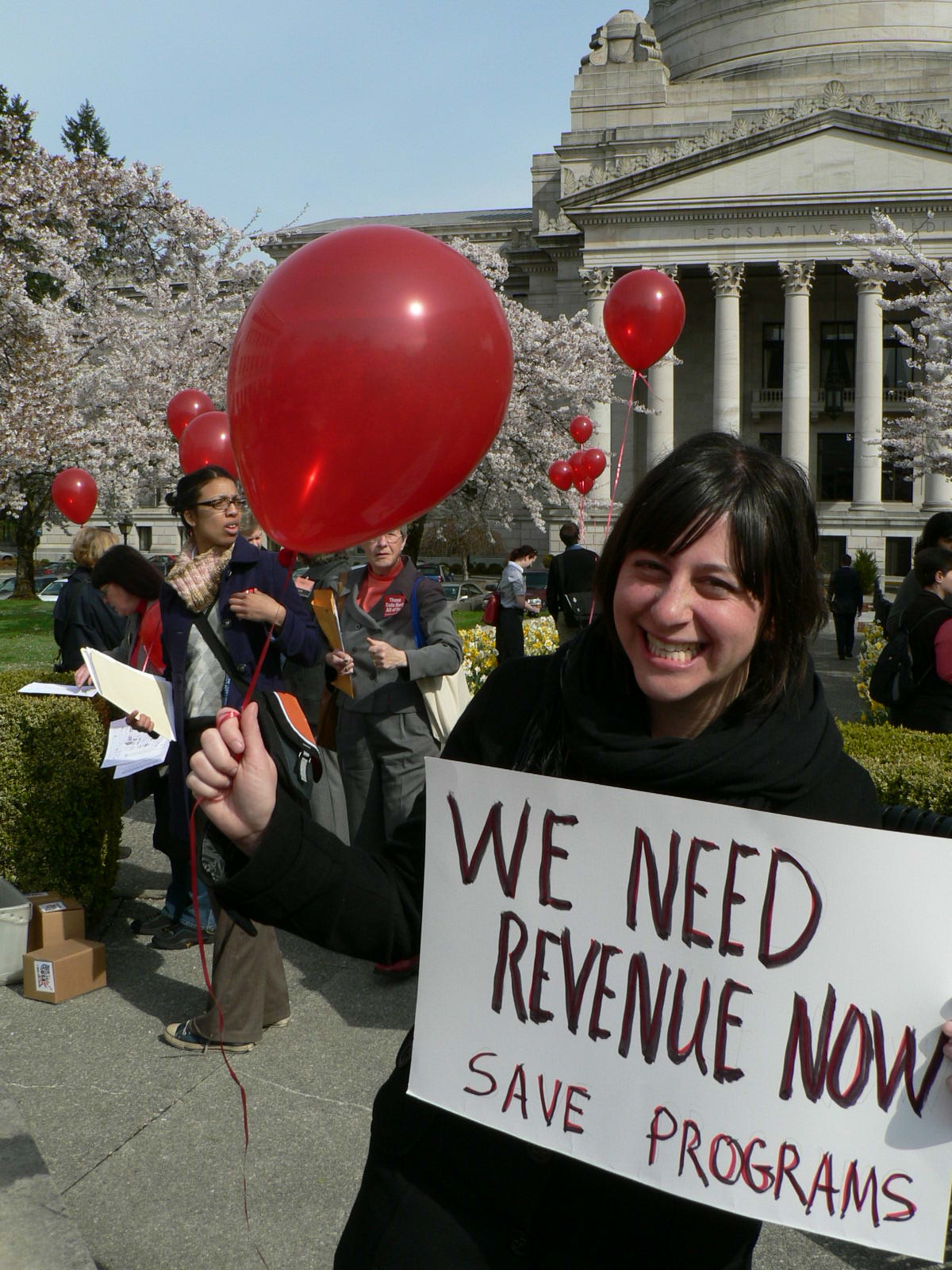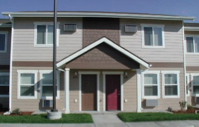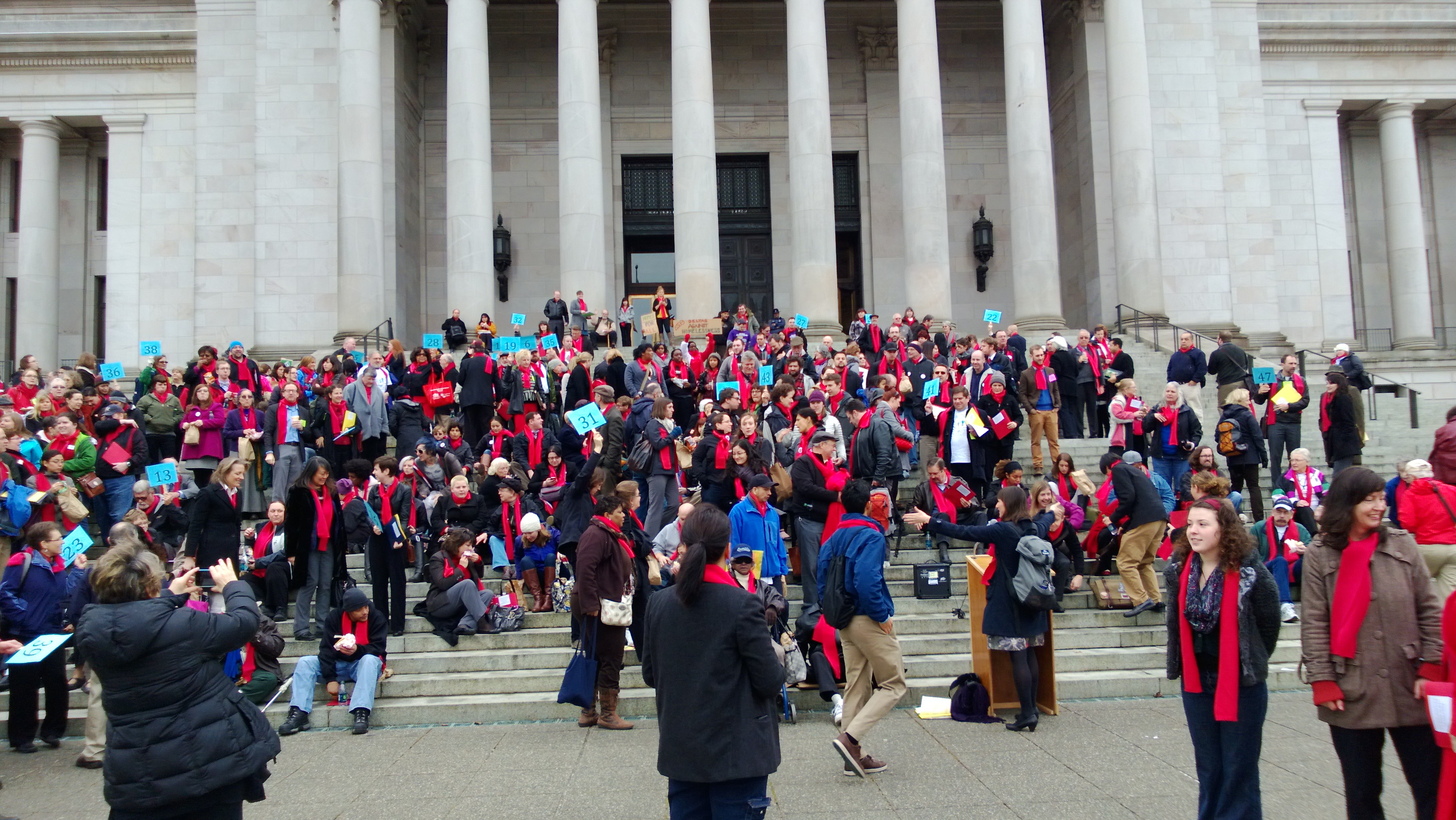Recent Blog Posts
Michele Thomas, Director of Policy and Advocacy
When the legislative session ended last weekend, many breathed a deep sigh of relief. Not only did we avert a government shutdown, but we also averted deep cuts previously proposed to affordable housing and homelessness programs. The fear that lawmakers would adjourn without a capital budget turned out to unfounded, and SSB 5895 - the dangerous “reform” bill that would cap all social services spending - was put down, at least until next year.
| As is almost always true, the long session brought both victories and missed opportunities. The passage of SSB 5568, the Fair Tenant Screening Act, which now seems ages ago, was a bright star of the session. Starting January 1, 2014, tenant screening companies can no longer report that an applicant for housing is a survivor of domestic violence, sexual assault, or stalking. | Image

|
Another standout was the early passage of SB 5147, to allow shelters three days before contacting a homeless youth’s parents or guardians. SB 5147 was the first bill signed by Governor Jay Inslee.
An Incredible Victory
Image

|
The preservation of the Housing and Essential Needs (HEN) and the Aged, Blind & Disabled (ABD) programs were incredible accomplishments that can only be chalked up to the persistent and passionate messages that lawmakers from every corner of the state heard from their constituents. That was coupled with the amazing team of Housing Alliance allies in Olympia. This included Statewide Poverty Action Network and Columbia Legal Services and the deep commitment to this population by the House Majority Speaker Frank Chopp and his caucus. Together, we made the preservation of these programs a must-do issue for the House. Because of this, thousands of disabled adults across the state will continue to receive financial assistance, housing assistance, and access to an essential needs bank. Medicaid expansion ensures that they will continue to receive medical assistance, while elderly disabled adult immigrants ineligible for Medicaid will continue to receive care from DSHS' Medical Care Services. |
The big news for Consolidated Homeless Grants (CHG) is that sweeps were restored! This means no cuts to CHG! CHGs fund emergency and domestic violence shelters and provide rent assistance. The Senate was forced to rescind their proposal to cut these critical programs by 50%. The final budget preserves all the programs funded by the CHG at current levels. This means that shelters, DV programs and rental assistance across the state will continue to keep people safely indoors.
A Significant Disappointment
The lack of revenue and the reliance on transfers and sweeps to balance the budget represents one of the biggest disappointments from the session. Without enacting revenue, budget deficits will continue to mark each session. And after more than $10 billion in cuts, significantly from social services, our lawmakers must enact new revenue so that we can begin to reinvest in the programs that help people meet their basic needs and enter a path of stability and opportunity. Read more about the lost opportunities to enact revenue from the Washington Budget and Policy Center’s Schmudget blog. The Housing Alliance encourages you to join us during the interim in advocating for revenue in 2014.
Capital Budget and Housing Trust Fund Outcomes
The capital budget (SB 5035) passed both chambers Saturday, June 29 almost unanimously and without any floor drama. The lack of floor debate belies the behind-the-scenes bargaining that accompanied the budget throughout the entire session. The capital budget funds projects and programs with a vast array of powerful stakeholders including local government, labor, and environmental organizations and, of course, affordable housing advocates.
|
In the end, the capital budget allocated a total of $3.6 billion in new appropriations, which included $70 million for affordable housing. Almost all of this $70 million is new money from state bonds, except for just $2.5 million, which was allocated from the Department of Commerce’s loan repayment account called the “Washington Housing Trust Account” (this is the same source of funds for the Washington Families Fund this year). Here's how the funds for affordable housing break down: $51.5 million for the Housing Trust Fund - subject to the LEAP list (LEAP 2013-1A) which allocates the following to these categories (more about the LEAP list below):
|
Image

|
There is also a ranked “alternate” list of projects in the scenario that one of the projects in the above categories is not eligible or ready to proceed. The ranked alternate list can also be found in the document titled LEAP 2013-1A and it includes 47 projects requesting almost $48 million from the Housing Trust Fund.
Another $4.5 million was allocated for public housing authorities to preserve five project-based buildings with expiring contracts. Of this appropriation, $2.5 million is from the Department of Commerce’s Housing Trust Fund account, "The Washington Housing Trust Account". The appropriation is solely for the following projects:
Charter House ($777 thousand)
Emerson Manor ($829 thousand)
Naches House ($1.065 million)
Wenatchee House ($1.173 million)
Harbor House ($656 thousand)
There is also a total of $14 million for a project in Seattle’s Sand Point neighborhood, referred to as “Building Nine”. This is a former military property currently held by the University of Washington and $4 million of the total appropriation is to reimburse the University for their care of the property.
The LEAP List
| Starting last year, the capital budget included a ranked list of projects eligible for the Housing Trust Fund appropriation. This is a remarkably different and, within the affordable housing world, controversial way of allocating funds. The Department of Commerce usually runs a competitive process for all potential HTF-funded projects, ensuring the most viable projects are awarded the funds. However, this new LEAP list significantly diminishes this process. | Image

|
Another important concern is that the list brings a corrosive political process into the funding decisions and into the affordable housing movement. Already, nonprofits felt the pressure to narrow their advocacy message to just their project instead of a broader funding focus. No one knows if the list is the new normal. But the Housing Alliance will work with lawmakers, affordable housing developers, and other stakeholders to further examine the impacts of the list and to explore a new way forward that still guarantees the highest possible allocation for affordable housing.
Other Capital Budget Highlights
The capital budget allocated a total of $20 million for weatherization programs with $10 million for Energy Matchmakers and $10 million for the Community Energy Efficiency Program (CEEP). The Energy Matchmaker program helps low-income folks make their homes more energy efficient. CEEP provides assistance to statewide community-based programs that encourage energy efficiency retrofits and upgrades for home and small-business owners.
The capital budget also included $5 million for community psychiatric inpatient beds for facilities with 16 or less beds. This will help keep mentally ill people safely off the streets.
More Operating Budget Details
| The bad news about Housing and Essential Needs program is that the final budget sweeps $14 million of unspent funds from the last fiscal year and reduces program-funding levels by a total of $20 million ($10 million each year of the next biennium). However, the good news is that despite these cuts, the program will be able to operate at current capacity. | Image

|
The great news regarding the Aged, Blind & Disabled program is that the legislature passed SHB 2069. This bill expanded the definition of disability, and the final budget bill added $2 million more in funding. The definition was expanded to ensure the state gets a 100% Medicaid match for program participants when the Medicaid expansion goes into effect on January 1, 2014. If the state doesn’t receive a 100% match as planned, then the expanded disability definition will sunset at the end of the biennium and revert to the current definition.
SSI facilitation was preserved at current levels. SSI facilitation is the process by which the state helps those with a permanent disability get onto federal SSI.
As mentioned earlier, Washington Families Fund received $2 million, allocated from the Department of Commerce's Washington Housing Trust Account. But that same account also received an increase of $2 million. So there's no net impact on other programs!
| Unfortunately, the final budget cuts TANF (Temporary Assistance to Needy Families) by $5.2 million and takes away a significant and artificially constructed “underspend” of $156 million and transfers it to the general fund. TANF couldn't spend this $156 million because of restrictive program changes enacted by legislators over the years. These changes have limited the number of people on the program, thus shoring up the $156 million "underspend". The legislature missed an opportunity to reinvest these unspent dollars back into the program. |
For example, they could have restored cuts to the monthly cash grant, which has been reduced over the years. Such action would have helped to ensure that TANF families could afford rent, avoid homelessness, and meet other basic survival needs. The current TANF grant is set at just $478/month for a family of three, or 31% of the federal poverty line.
The final budget allocates just $5 million for the governor's new rapid re-housing program. The $5 million came from the Home Security Fund (HSF), which consists of real estate document recording fee dollars. This means that the program is funded only by HSF and no TANF funds or other state sources. It's possible that DSHS could still allocate some of their funds for this program, but it's uncertain if they will and uncertain what other programs will be impacted by such a move.
The budget also included $500,000 for the Limited English Proficiency program. And initially the Senate proposed terrible changes to the program, including a new time limit, a cut to the grant level, and a cap on the family size accommodated by the program. Thankfully, all were all defeated.
Special thanks for our friend Kate Baber at Statewide Poverty Action Network for background on the outcomes for TANF and for Poverty Action’s skillful advocacy on behalf of the TANF program.
And thank YOU for staying updated with us and taking action! Whether you took action just once or throughout the entire legislative session, we couldn't have done it without your help! Please consider making an end-of-session gift to the Housing Alliance so we can keep up the momentum to ensure all Washington residents have an opportunity for a safe, healthy, affordable home!



Add new comment